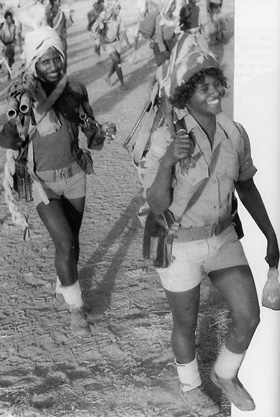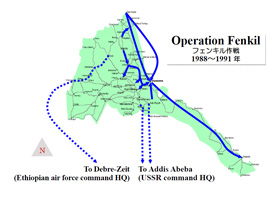Date: Fri, 6 Feb 2015 23:13:53 +0100
Historic step on the long march to freedom – “Operation Fenkel 1988 – 1991”:
06.02.2015
On August 1988, after a heroic and protracted defensive war of wear and tear, between the USSR lead army of Ethiopia and Eritrea, which was carried out in the ranges of the (Nakfa) Sahel mountains and its environs for a decade, Eritrean peoples Liberation army (EPLA) made a decisive strategic offensive to occupy a major front surrounding the town of Afabet (Sahel).
Afabet is strategic town, which hosted the master minds of the war, i.e. Soviet and their allies’ command station. It is located south of the mountains of Sahel. It is also a gateway as well as a trade corridor to the agricultural and resource rich west and the eastern lowlands of Eritrea.
Wuchu, a veteran army commander in the EPLA, announcing the start-up of the offensive to his division named this battle an “open-end invitation to the funeral”. Basil Davidson, British historian who witnessed the battle named it “Second Diem Bien Phu”. Both agree that the success of this historic initiative shall change, once and for all, the gravity of the military landscape in the Horn of Africa.
This battle heralded and opened a new momentum and opportunity, for EPLA, to use mechanized, infantry, naval coordinated firepower and experience. All the lessons accumulated in the past thirty year’s war history, including but not excluding the outstretched elite commando forces capability outside the perimeter of these battle events, were effectively and innovatively used as an instrument to win this historic battle decisively. The offensive was unanimously welcomed and supported by the local population in Eritrea and abroad. Ethiopian army, navy and air force mutinied and were unfortunately mercilessly crashed by their commanders (USSR and their allies).
In 1989, EPLA engaged the remaining heavily armed enemy. It continuously stretched itself on the coastal lowlands to effectively and fully control the Red Sea coast and adjacent Islands. The life-line to the USSR backed Ethiopian army, Massawa – Asmara – Addis Abeba road corridor; fell into the hands of EPLA. All attempts to recover this post by the enemy forces were once and all frustrated.
In 1990, all concentric defensive lines of the enemy, armed to the teeth, stretching for about 80 to70 kms, guarding the Port of Massawa and the Soviet nuclear post in Dahlak (Nakura) from land, sea and air, were also again painted with pictures of heroism. Port of Massawa was freed. The battle and its vibration engulfed East Africa. It induced Washington and Moscow telephone hotline to go operational. Diplomatic pressures of superpowers were intensified. Skud missiles rained in the freed Massawa Port and its environs fired from a distant USSR ships anchored on the Red Sea for weeks. EPLA which was composed of men and women fighters stood stead-fast and made Massawa (“Pearl of the Red Sea”) - the epicenter of freedom. 30% of the fighting forces were women.
In the same year, the long march of EPLA flanked from the north, covering a distance of about 1200 kms from the Port of Massawa started homing to the main command headquarters of the enemy both in Assab (Eritrea southern port city), Addis Abeba (Capital of Ethiopia) and they also flanked from the west another distance of about 1500kms from the Port of Massawa homing to the headquarter of Debrezeit (Main Air force base and headquarter of Ethiopia). EPLA took the entire East Africa in its canvas and painted a picture of heroism, putting another milestone of solidarity and cooperation between the brotherly people of the region.

